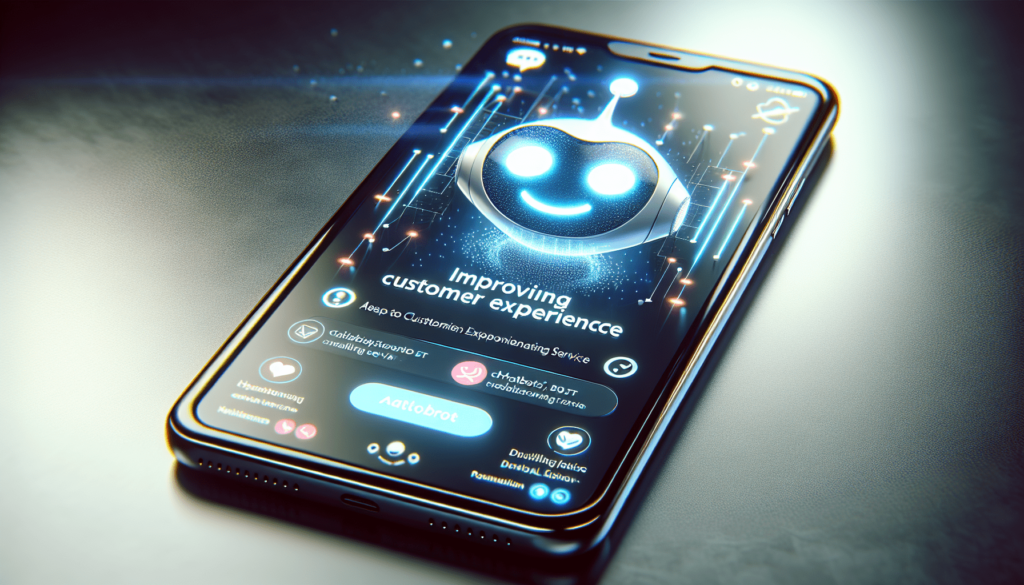Your cart is currently empty!
Enhancing Customer Experience: AI Chatbots For Local Businesses
When it comes to enhancing customer experience for local businesses, AI chatbots play a crucial role. In this article, you will discover the impact of AI chatbots on customer interactions and how they can uplift the overall customer experience. Learn how AI chatbots are revolutionizing the customer service landscape for local businesses.
Enhancing Customer Experience: AI Chatbots For Local Businesses
In the digital age, customer experience plays a crucial role in the success of local businesses. As more consumers turn to online platforms for their purchasing decisions, it has become increasingly important for businesses to provide efficient and personalized customer service. One of the innovative ways local businesses can enhance their customer experience is by leveraging AI chatbots. These advanced tools not only streamline communication processes but also offer 24/7 support and personalized interactions for customers. In this article, we will delve into the impact of AI chatbots on customer experience for local businesses and how they can be effectively implemented to drive growth and success.

Understanding AI Chatbots
Artificial Intelligence (AI) chatbots are computer programs designed to simulate conversation with human users, especially over the internet. By leveraging natural language processing and machine learning algorithms, AI chatbots can understand and respond to user queries in real-time, providing instant assistance and information. These virtual assistants can be integrated into various messaging platforms, websites, and mobile applications to interact with customers seamlessly.
AI chatbots come in different forms, ranging from rule-based chatbots that follow predefined scripts to more advanced chatbots powered by AI algorithms that learn and improve their responses over time. These sophisticated chatbots can analyze data, understand user preferences, and deliver personalized recommendations, creating a tailored experience for each customer.
The Benefits of AI Chatbots for Local Businesses
1. Enhanced Customer Service
AI chatbots offer local businesses the opportunity to provide round-the-clock customer support, addressing inquiries and resolving issues even outside of regular business hours. With AI chatbots, customers can receive instant responses to their queries, leading to improved satisfaction and loyalty. By automating repetitive tasks and frequently asked questions, businesses can free up their human resources to focus on more complex issues and high-value interactions.
2. Personalized Interactions
One of the key advantages of AI chatbots is their ability to deliver personalized interactions to customers. Through data analysis and machine learning, chatbots can understand user preferences, purchase history, and behavior to offer tailored recommendations and suggestions. This level of personalization not only enhances the customer experience but also increases engagement and drives sales for local businesses.
3. Cost-Effective Solution
Implementing AI chatbots can be a cost-effective solution for local businesses, especially when compared to hiring and training additional customer service representatives. Chatbots can handle multiple conversations simultaneously, reducing wait times for customers and increasing operational efficiency. Additionally, AI chatbots can scale to meet growing demands without a significant increase in costs, making them a scalable solution for businesses of all sizes.
4. Data Collection and Analysis
AI chatbots serve as valuable tools for collecting and analyzing customer data. By tracking user interactions, preferences, and feedback, businesses can gain valuable insights into customer behavior and sentiment. This data can be leveraged to improve products and services, develop targeted marketing strategies, and enhance overall customer experience. With AI chatbots, local businesses can make data-driven decisions to drive growth and profitability.

Implementing AI Chatbots for Local Businesses
1. Define Objectives and Use Cases
Before implementing AI chatbots, local businesses should clearly define their objectives and use cases for these virtual assistants. Whether the goal is to improve customer service, increase sales, or streamline processes, having a clear strategy in place is essential for a successful chatbot implementation. Businesses should identify the most common customer inquiries and pain points to tailor the chatbot’s functionalities accordingly.
2. Choose the Right Platform and Technology
When selecting a platform for AI chatbot development, local businesses should consider factors such as ease of integration, scalability, and customization options. There are various chatbot development tools and platforms available, ranging from DIY solutions to enterprise-grade AI platforms. Businesses should evaluate their requirements and budget to choose the right technology that aligns with their objectives.
3. Develop Conversational Scripts and Training Data
Creating conversational scripts and training data is a crucial step in developing an effective AI chatbot. Businesses should map out potential user interactions and responses to ensure that the chatbot can handle a wide range of queries and scenarios. Training data should be continuously updated and refined based on user feedback and interactions to improve the chatbot’s accuracy and performance over time.
4. Test and Iterate
Testing is an essential phase in the implementation of AI chatbots for local businesses. Before deploying the chatbot to customers, businesses should conduct thorough testing to identify and address any issues or bugs. User acceptance testing and feedback sessions can help refine the chatbot’s functionalities and improve its overall performance. Continuous iteration and improvement are key to ensuring that the chatbot meets the needs and expectations of customers.
5. Monitor Performance and Gather Insights
Once the AI chatbot is live, local businesses should monitor its performance and gather insights to assess its impact on customer experience and business outcomes. Tracking key metrics such as response time, user satisfaction, and conversion rates can provide valuable insights into the chatbot’s effectiveness. Businesses should regularly review feedback and analytics data to identify areas for improvement and optimization.
Case Studies: Successful Implementation of AI Chatbots in Local Businesses
1. Restaurant Reservation Chatbot
A local restaurant implemented an AI chatbot on its website to streamline the reservation process and enhance customer service. The chatbot allowed customers to make reservations, browse the menu, and get directions to the restaurant. By automating the reservation process, the restaurant improved efficiency, reduced wait times, and increased customer satisfaction. The chatbot also collected customer feedback and preferences, enabling the restaurant to personalize future dining experiences.
2. E-Commerce Customer Support Chatbot
An e-commerce store integrated an AI chatbot into its messaging platform to provide instant customer support and personalized recommendations. The chatbot assisted customers with product inquiries, order updates, and returns, offering 24/7 assistance. By analyzing user behavior and purchase history, the chatbot delivered tailored product suggestions, leading to increased sales and customer engagement. The e-commerce store saw a significant improvement in customer retention and satisfaction.
Future Trends and Opportunities
As AI technology continues to evolve, the future of AI chatbots for local businesses holds promising opportunities for growth and innovation. With advancements in natural language processing, machine learning, and sentiment analysis, AI chatbots are becoming more intelligent and capable of handling increasingly complex interactions. Integrating AI chatbots with other emerging technologies such as voice assistants and augmented reality presents new possibilities for enhancing customer experience and driving business success.
Moreover, the rise of omnichannel communication and personalized marketing strategies creates new avenues for AI chatbots to engage with customers across various touchpoints. By delivering seamless and consistent experiences across different channels, AI chatbots can build stronger relationships with customers and foster brand loyalty. Local businesses that embrace AI chatbot technology and adapt to changing consumer preferences will be well-positioned to thrive in a competitive marketplace.
Conclusion
In conclusion, AI chatbots present a valuable opportunity for local businesses to enhance customer experience, increase efficiency, and drive growth. By leveraging AI technology to automate customer interactions, personalize recommendations, and gather valuable insights, businesses can create a more streamlined and engaging customer journey. With the right strategy and implementation, AI chatbots can revolutionize the way local businesses interact with their customers, leading to improved satisfaction, loyalty, and business success. Embracing AI chatbots as a part of the customer experience strategy can position local businesses for long-term competitiveness and innovation in the digital era.